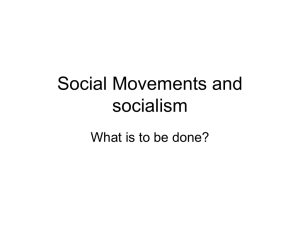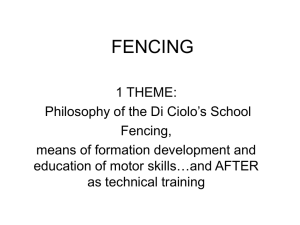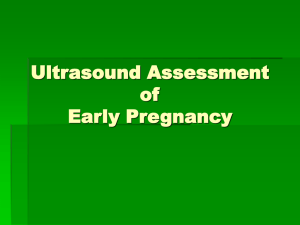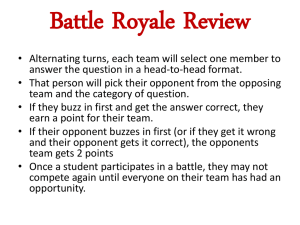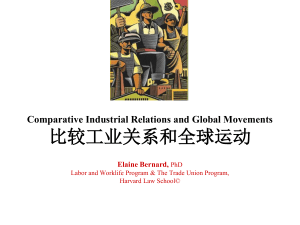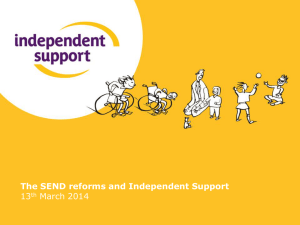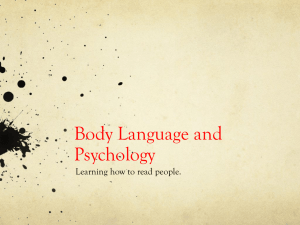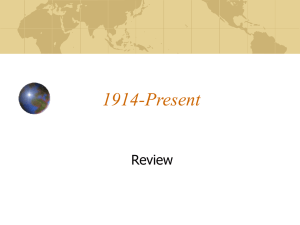Another world is under construction? Social movement responses to
advertisement
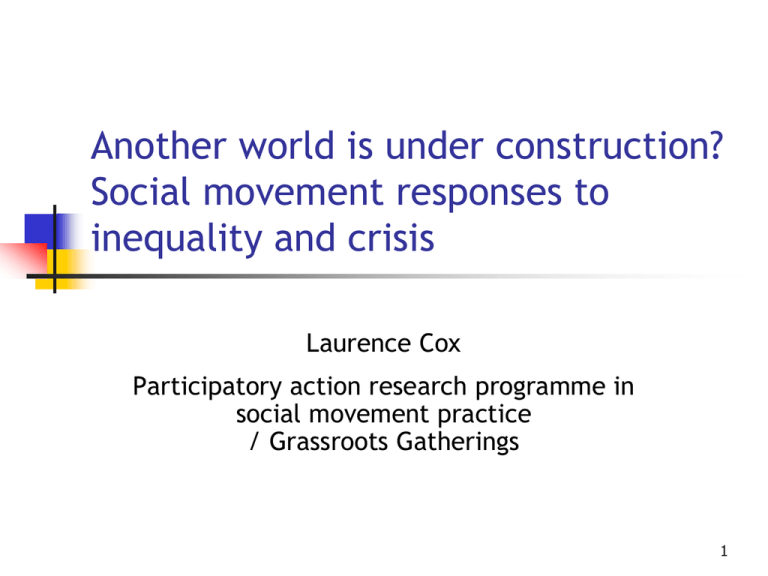
Another world is under construction? Social movement responses to inequality and crisis Laurence Cox Participatory action research programme in social movement practice / Grassroots Gatherings 1 Green Party experience 1998 editorial (DL and Labour in power): we are fools to see the state, EU, media and legal systems as our natural allies Betting on elites abandons popular mobilisation (and hands it to the right) GP in government did sell out allied movements on Shannon, Tara, Rossport 2009 attack on unions on behalf of media Making our organisations dependent on elites comes at a heavy political cost 2 Inequality is no accident Structured constellations of power, interest and culture underpin systemic inequality Serious struggles for equality involve confronting these directly Central role of independent social movements of those without power and wealth Power from below: numbers, delegitimising elites and capacity to disrupt “Bait and switch” where we forget this and seek to convince the powerful instead 3 The antidote to inequality is popular movements For most of the world democracy, independence from empire and (where they exist) welfare states arrived in living memory They were forced on elites by massive popular movements which overthrew empires, remade states and forced preventative concessions Defusing this basic historical fact – and normalising existing arrangements as eternal – is crucial to “business as usual” 4 Popular movements in Ireland Land War transformed class structure Civil Rights Movement in North Women’s movement defeated church, broke “private patriarchy” LGBTQ movements reshaped Irish sexuality Defeat of nuclear power at Carnsore Scale of community action, from housing campaigns via CPAD to Tenants First Rossport still holding off Shell and state Irish movement experience different, but not less than e.g. W Europe or Latin America 5 Squaring the circle – for a little while Brief period in Ireland of advancing equality while avoiding direct confrontation with state power Some movements helped elites modernise Irish society (“pushing on an open door”) EU and Celtic Tiger enabled funding without redistribution Structural transformation went on long finger Historical context and strategic thinking forgotten Institutional / policy framework assumed as given This period is now ending as quickly as it came 6 Movements into “sectors” This process has affected trade unions, community action, women’s organisations, LBGTQ activism, environmentalists, youth workers, development / solidarity groups, health / disability groups, anti-racism etc… As we have become “sectoralised” we have lost track of what’s happened to each other and focussed on the state 7 Business as usual is over Elites see decreasing “rate of return” from institutionalised movements (union experience) The Irish state no longer wants independent advocates for equality (which tells us something) Inconvenient groups shut down, shut up or assimilated into the state Parallels earlier US experience of “War on Poverty” This predates the crisis, but crisis provides an excuse “Partnership” rules are being unilaterally rewritten State “responds to P – K4 with a lob over the net” Many groups have no alternative strategy but to plead for the re-establishment of partnership 8 Global neo-liberal context Welfare states in W and national developmentalism in S represented elite compromises with popular movements (anti-fascist resistance, anti-colonial nationalism, organised working class) Neo-liberalism can’t make such deals constant problem of legitimacy and consent Hence right-wing populism, fundamentalism, “opinion” as leisure activity, etc. Search for “progressive” consent 9 Global “civil society” as simulation of consent New meaning of “civil society” as approved interlocutors of power (contrast with 1980s) Often violently opposed to “incivil society”, movements of the poor (RSA, India, Thailand…) Movement language and processes borrowed for neo-liberal “governance” (consultation etc.) Cut-price service delivery in majority world Economic gains for small constituencies or cultural ones for larger ones sometimes possible NGOs etc. used as cheap sources of legitimacy in return for official status and / or funding 10 Neo-liberalism in systemic crisis “Globalisation from below” of popular movements against neo-liberalism (esp. Latin America, India, South Africa, W. Europe) Crisis of legitimacy (summit protests, failure of war to restore “authority”) Foreign policy crisis (in Middle East, “pink tide” in Latin America) Economic failures (financial crash, food crisis, global warming) 11 Why systemic crisis? Regimes of accumulation are medium-term institutional arrangements, subject to change albeit at a cost; they’re provisional only When they no longer work for elite groups, they abandon them (as in 1970s) for alternative strategies, wise or unwise Similarly, many NGOs seeking to turn back into SMOs: “respectable face of the movement”, not “caring face of capitalism” 12 … and Ireland? Crisis of developmentalism came early Belief that inequality etc. came from “lagging behind”, lack of state commitment etc. State and European elites seen as “on the side” of movements or capable of being so Generational “coming in from the cold” 1990s conversion of social movement organisations (SMOs) into NGOs 13 Boiling the frog, slowly Intense sectoral fragmentation on state terms – unions, community, environmental, development / solidarity, peace / left… Professional core has become key to what were once movement organisations Specialising in policy, funding, media etc. Non-career participants unable to keep up, progressively demobilised “clients” Groups which have not fitted the new forms and structures have gone to the wall 14 “You and whose army?” Structural weakness faced with aggressive attacks from state and media elites Loss of broader activist base, ability to mobilise large numbers, capacity to disrupt Need for participation, legitimacy, funding etc. to continue organisations Hence “the means justify the ends” State can happily roll up separate “sectors” on its own terms, in its own time 15 People’s Global Action experience Zapatista-sponsored Encuentro, 1996 Asian peasant organisations: “we came here to shut down the financial institutions” Seattle: direct action on the streets and new confidence of majority world countries collapse World Trade Organisation meeting No new “round” possible since then This achieved by popular movements refusing to let elites set the terms of debate 16 Strategic crisis of Irish movement organisations Financial dependency on state, EU, donors Two decades of professionalisation, demobilisation and respectability Such organisations now find it hard to defend themselves, never mind their broader agenda, against their sponsors State, EU and (most) donors will ultimately side with powerful, wealthy and culturally dominant against the poor and powerless Where can movements for equality stand that is not dependent on their opponents? 17 Is there life after partnership? Think seriously about how we can win Routine politics, when the rules are rewritten from above, are a strategy for being sidelined Relativise our routines / known world of “the sector” – make new allies on unofficial terms Stand up to the state, together and publicly Build sustainable movement-based groups Stop making ourselves dependent Remember we used to do this stuff! 18 What does this mean in practice? Take our stand not in official legitimacy but in popular struggles mass challenge to power Raise large themes, not just technical objections Move from funding-led to membership-led, in finances, activities and strategies Rethink role of core workers: from career-based to mass-based organising strategies From “working the system” to campaigning, mobilising, popular education for structural change Strategy for successful confrontation with power starts with how we organise ourselves 19 Reasserting equality within movement organisations Move from being transmission belt for priorities and structures set from above, back to grassroots-controlled organisations Change in training and education: from convincing elites / securing funding to mobilising, radicalising, winning Rely on natural strengths of popular movements: delegitimising power, disrupting business as usual, setting alternative agendas See ourselves as part of movement, not part of state 20 What role for NGOs etc. after partnership? Service delivery, lobbying etc. useful and necessary, but no substitute for mobilising Complementarity to popular movements as “respectable interlocutors” for state This only works if there is a popular movement to force the state to negotiate … and if NGOs etc. act out of solidarity with popular movements rather than in competition with them, as would-be monopoly representatives of civil society 21 Solidarity across movements State’s new priorities cannot be effectively challenged using “the master’s tools” “Ecology of knowledges” and languages has to be developed in struggle, from below Movements need each other to move outside state, media, academic definitions of reality “Your struggles are also my struggles” – if our goal is equality 22 Learning from each other’s practice: what we can do Survivor struggles highlighting the structural violence of the past and elite collusion Rossport alliance across movements and issues in face of overwhelming force Tenants First etc. moving outside “sector” Migrant-led organisations and Bloom! Return of disruptive tactics and popular voice Loss of popular legitimacy for state policy 23 Delegitimising the elites Government, Finance, EU, media etc. claim to speak for the general interest This enables them to attack our organisations, create new inequalities and deepen existing gulfs Movements have to set popular terms of debate, not remain on hostile terrain defined by statute, administrative practice and academic specialisations Stand outside purely national / EU setting 24 “Another world is under construction”: some proposals A counter-summit linking movements and sectors to visibly challenge and delegitimise state practice Movement-based: large-scale participation, democratic processes and popular (not technical) priorities Tied to strategic mass action for equality outside “channels” 25 Learning to be loyal to each other, not organisations Summer schools etc. to bring activists from different movements together in selfcontrolled, self-funded spaces Build collective strength, self-confidence, shared perspective for the long haul Change sense of “we” from professionals in sector to popular movements in action Learn from international experiences Highlander Folk School model may help 26 A national conversation outside the state Model of Zapatista “Other campaign” Slow, non-party tour of the country Listening to communities, workplaces, movements and others Conversation with each other about needs, equality and power “Beyond alliances of activists … to building general cultures of politics and life” Remaking the country “from below and on the left” 27 Hanging together – or hanging separately Our practice has conceded elites the right to set the agenda and take equality off the table To fight for equality we have to step outside their terrain and become independently powerful actors again, on our own terms There is no textbook for doing this – but plenty of historical experience and “globalisation from below” to learn from 28 We can do it, ourselves “Our liberties were won in wars and revolutions so terrible that we do not fear our governors: they fear us. Our children giggle and eat ice-cream in the palaces of past rulers. We snap our fingers at kings. We laugh at popes. When we have built up tyrants, we have brought them down.” (Ken MacLeod) 29



